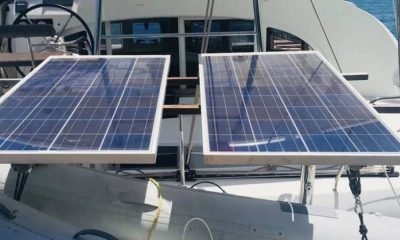Large -Scale Solar Panels
E.ON switches 3.3 million homes to 100 per cent renewable power

Energy giant says that from today all domestic customers will receive 100 per cent renewable power at no extra cost.
The green tariff market just welcomed a major new player, after energy giant E.ON announced all its tariffs have switched to 100 per cent renewable power as standard.
The company revealed today that it has moved all its 3.3 million residential customers to 100 per cent renewable electricity supplies, promising to ensure their power use is matched by wind, biomass, and solar supplies. The company said the move was the largest of its type to date in the UK and would be delivered at no extra cost to customers.
The move provides further evidence that renewable power, whether sourced directly or through proof of origin certificates, can be secured at little to no price premium compared to standard power from the grid.
Alongside the announcement, E.ON released the results of a YouGov survey of over 4,300 people which found growing consumer demand for clean energy tariffs.
The survey found 61 per cent of those not already on a renewable tariff would like to switch to green power if the move could be made at a “reasonable price”. Moreover, over three quarters said they were concerned about climate change and 79 per cent said they could do more to become more sustainable.
“Climate change is the defining issue of our era, and one that energy customers are increasingly concerned about,” said E.ON UK chief executive Michael Lewis. “We believe large-scale action can make significant change possible and we’re committed to playing a leading role and setting an example for others to follow, that’s why we’re providing all of our residential customers with 100 per cent renewable electricity as standard – a change at a scale never seen before in Britain.”
He added that the move was part of a wider push by the company to slash its emissions and expand its clean tech offerings. “Our announcement is an important first step in a journey towards a more sustainable and personalised energy system, but the future of energy doesn’t stop here,” he said. “The opportunities include helping all of our customers to better manage their energy through smart, personalised and sustainable technologies.”
The move comes just days after the company launched a range of new interest free financing options to help homeowners spread the cost of installing solar and storage systems. It also follows the announcements earlier this month that E.ON’s German operations have launched a new service to improve the energy efficiency of supermarkets and have agreed to acquire the biomethane arm of gas giant WINGAS.
The market for green tariffs has exploded in recent years, as specialists such as Ecotricity and Good Energy have expanded and mainstream energy suppliers have developed their own renewables offerings. ScottishPower last year became the first Big Six operator to unveil plans to shift to 100 per cent renewables generation with the sale of its gas operations to Drax.
Large -Scale Solar Panels
Giant batteries and cheap solar power are shoving fossil fuels off the grid

This month, officials in Los Angeles, California, are expected to approve a deal that would make solar power cheaper than ever while also addressing its chief flaw: It works only when the sun shines. The deal calls for a huge solar farm backed up by one of the world’s largest batteries. It would provide 7% of the city’s electricity beginning in 2023 at a cost of 1.997 cents per kilowatt hour (kWh) for the solar power and 1.3 cents per kWh for the battery. That’s cheaper than any power generated with fossil fuel.
Mark Jacobson, an atmospheric scientist at Stanford University in Palo Alto, California, tweeted after news of the deal surfaced late last month. “Because of growing economies of scale, prices for renewables and batteries keep coming down,” adds Jacobson, who has advised countries around the world on how to shift to 100% renewable electricity. As if on cue, last week a major U.S. coal company—West Virginia–based Revelation Energy LLC—filed for bankruptcy, the second in as many weeks.
The new solar plus storage effort will be built in Kern County in California by 8minute Solar Energy. The project is expected to create a 400-megawatt solar array, generating roughly 876,000 megawatt hours (MWh) of electricity annually, enough to power more than 65,000 homes during daylight hours. Its 800-MWh battery will store electricity for after the sun sets, reducing the need for natural gas–fired generators.
Precipitous price declines have already driven a shift toward renewables backed by battery storage. In March, an analysis of more than 7000 global storage projects by Bloomberg New Energy Finance reported that the cost of utility-scale lithium-ion batteries had fallen by 76% since 2012, and by 35% in just the past 18 months, to $187 per MWh. Another market watch firm, Navigant, predicts a further halving by 2030, to a price well below what 8minute has committed to.
Large-scale battery storage generally relies on lithium-ion batteries—scaled-up versions of the devices that power laptops and most electric vehicles. But Jane Long, an engineer and energy policy expert who recently retired from Lawrence Livermore National Laboratory in California, says batteries are only part of the energy storage answer, because they typically provide power for only a few hours. “You also need to manage for long periods of cloudy weather, or winter conditions,” she says.
Local commitments to switch to 100% renewables are also propelling the rush toward grid-scale batteries. By Jacobson’s count, 54 countries and eight U.S. states have required a transition to 100% renewable electricity. In 2010, California passed a mandate that the state’s utilities install electricity storage equivalent to 2% of their peak electricity demand by 2024.
Large -Scale Solar Panels
Invenergy Completes Financing for Its Largest Solar Project to Date

Invenergy, a leading privately-held developer and operator of sustainable energy solutions, announced that it completed construction financing on Dec. 19, 2018 for its largest solar project to date, the 160-megawatt Southern Oak Solar project, located in Mitchell County, Georgia.
CoBank acted as sole lender, issuing bank, collateral agent and administrative agent for the deal.
In May of 2018, Invenergy and Georgia Power announced a power purchase agreement for Georgia Power to buy all the energy, environmental attributes and electrical products from Southern Oak Solar through 2049. This agreement is part of the utility’s Renewable Energy Development Initiative (REDI), which is designed to advance the growth of renewable energy goals across the state of Georgia.
“The completion of construction financing for Southern Oak Solar represents far more than a financial milestone,” said Invenergy’s President and Chief Operating Officer Jim Murphy. “Southern Oak Solar is a significant transaction with leading utility Georgia Power, and it is also our largest solar project to date, firmly establishing Invenergy as a leading developer of utility scale solar projects.”
Construction on Southern Oak Solar began in September 2018, and solar panels for the project are being provided by LONGi Solar Technology (U.S.) Inc. Other major partners on the project include RES (Renewable Energy Systems), who will construct the project, and NEXTracker Inc. for supply of the single axis trackers and its state-of-the-art TrueCapture™ control system.
The facility is scheduled to begin commercial operation by year-end 2019 and will create more than 400 jobs during construction. It will provide enough renewable energy to power more than 30,000 homes. The project will generate more than $12 million in local economic development in its first 10 years of operation through tax payments, lease payments to participating landowners, and wages and benefits for employees.
Large -Scale Solar Panels
ABB to construct solar power expansion in Dubai

ABB wins order worth over $90 million from Dubai Electricity and Water Authority (DEWA), a leading power utility in United Arab Emirates (UAE), to build the substation to strengthen Dubai’s power grid and reduce carbon footprint. This will be ABB’s second substation for the park, exemplifying the company’s commitment to deliver reliable power to consumers and serve the building and infrastructure sector alongside utility and industry customers.
After years of rapid growth and urbanisation, Dubai continues to be one of the fastest-growing cities in the world. The booming growth in population and economic sectors such as tourism, have increased the demand for energy. To boost power supply and meet the goals for increased use of renewables, the UAE launched its ambitious Dubai Clean Energy Strategy 2050 to make Dubai a global centre of clean energy and green economy.
The Mohammed bin Rashid Al Maktoum solar park, located inland 50 km south of Dubai, has been a central part of Dubai’s renewable strategy. When completed in 2030, the park will occupy 214 square km, generate 5,000 MW and reduce carbon emissions by approximately 6.5 million tonnes.
ABB is in charge of the design, supply, and installation and commissioning of the Shams 400/ 132 kV substation, which once completed, will have an overall capacity of more than 2,000 megavolt amperes (MVA). When Phase-3 of the project is finished in 2020, which is the same year that Dubai will host Expo 2020, the total solar power generated through Solar Photovoltaic will exceed 1,000 MW, and significantly lower carbon emissions.
“We are proud to work with DEWA and continue to contribute to this landmark project with our state-of-the-art technologies that will boost capacity and bring cleaner solar power to the people,” said Claudio Facchin, President of ABB’s Power Grids Division. “Integrating renewables is a key element of our Next Level strategy and our proven track record reinforces our position as a partner of choice for enabling a stronger, smarter and greener grid.”
“In Dubai, we have a comprehensive approach to the energy sector. We are committed to achieve the objectives of the Dubai Clean Energy Strategy 2050, which was launched by His Highness Sheikh Mohammed bin Rashid Al Maktoum, Vice President and Prime Minister of the UAE and Ruler of Dubai, to provide 75 percent of the Emirate’s total power output from clean energy by 2050. Meeting the clean energy objectives requires a capacity of 42,000 MW of clean and renewable energy by 2050. The most prominent project to achieve these objectives, is the Mohammed bin Rashid Al Maktoum Solar Park, which will have a generation capacity of 5,000 MW by 2030, with investments totaling AED50 billion. The solar park will contribute to reducing over 6.5 million tonnes of carbon emissions per year when completed”, said HE Saeed Mohammed Al Tayer, Managing Director and CEO of DEWA.
The ABB substation includes supply of 400 and 132 kV gas-insulated switchgear, power transformers, protection, automation and control systems as well as surveillance and communication systems. The substation will also be IEC 61850 enabled, to support open and seamless communication with all intelligent devices. In 2017, ABB delivered its first substation connecting the second phase of the MBR Solar Park and integrating 200 megawatts (MW) of electricity to the transmission grid.
-

 Solar Panels6 years ago
Solar Panels6 years agoAre Tesla solar roof tiles worth it?
-

 Genel6 years ago
Genel6 years agoMaldives luxury resort is powered entirely by solar panels
-

 Control Systems Et Software6 years ago
Control Systems Et Software6 years agoHOMER responds to the rapidly growing solar+storage market with Grid software
-

 Solar Technologies5 years ago
Solar Technologies5 years agoGOODWE PARTNERSHIP WITH GE
-

 Solar Technologies4 years ago
Solar Technologies4 years agoSolar panel covered Autobahn can break speed record for Germany’s energy transition
-

 Operation and Maintenance6 years ago
Operation and Maintenance6 years ago1000-Acre Sunflower Solar Farm to be Built for Entergy Mississippi
-

 Events5 years ago
Events5 years agoGREENoneTEC revolutionizes solar heating with Sunpad
-

 Large -Scale Solar Panels6 years ago
Large -Scale Solar Panels6 years agoABB to construct solar power expansion in Dubai



